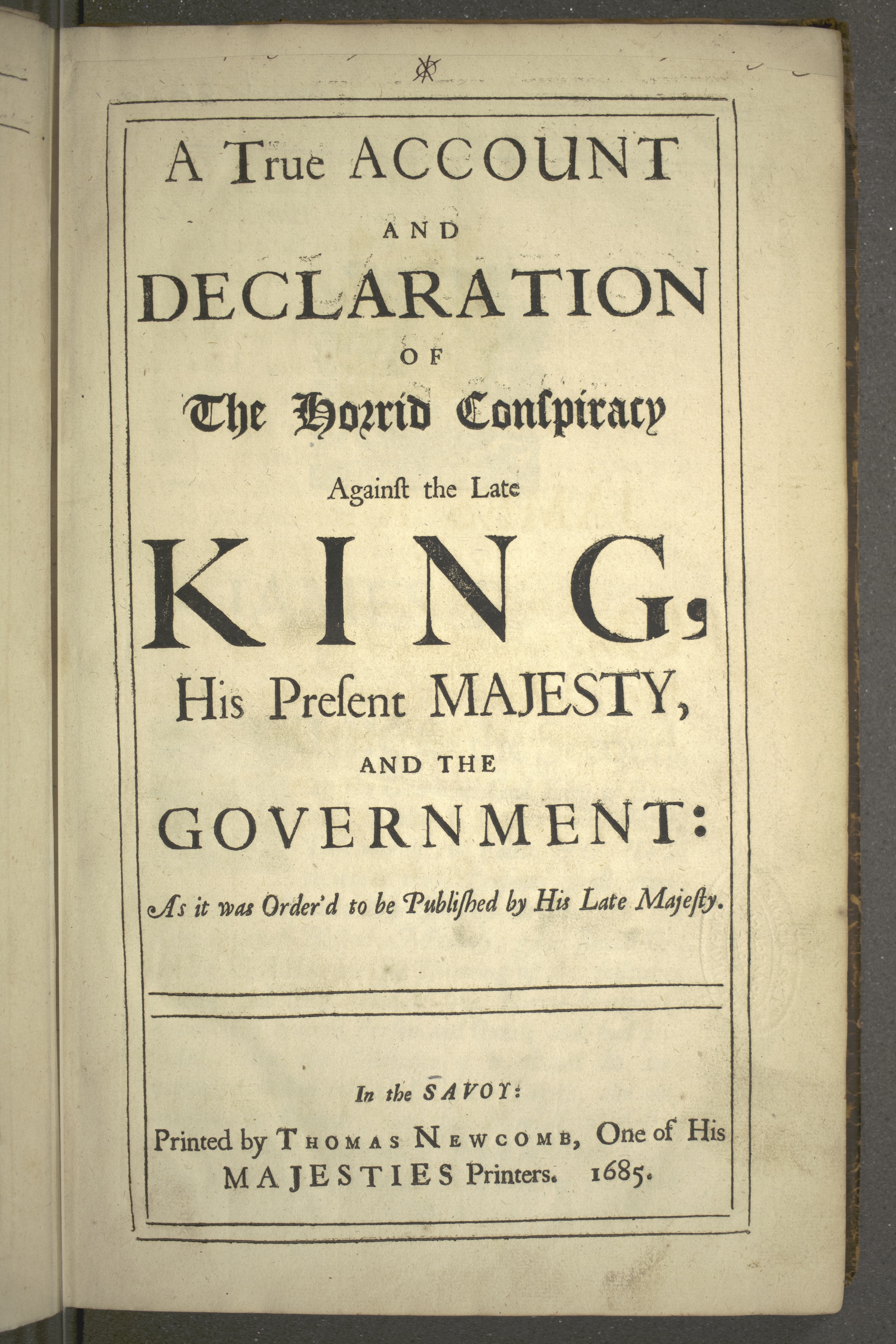- Introduction ⬥
- Timeline ⬥
- Section One ⬥
- Section Two ⬥
- Section Three ⬥
- Section Four ⬥
- Introduction >
- Timeline >
- Section One >
- Section Two >
- Section Three >
- Section Four >
To the Most Reverend Fathers in God, William Lord Archbishop of Canterbury, Primate of all England and metropolitan, and John Lord Archbishop of York, Primate of England and metropolitan.
England and Wales. Sovereign (1685-1688: James II)
London: Printed by Charles Bill, Henry Hills, and Thomas Newcomb, printers to the Kings most excellent majesty; 1685
This book, a document of control combining a prefatory letter in italic font and Directions Concerning Preachers in black letter font, is provocative insofar as it seeks to ban all forms of political discourse from the pulpit as to “the Dishonour of God, the Scandal of Religion and Disturbance of the Peace both of Church and State [and] Inflaming, Fomenting, and Heightening of the sad Distempers and Confusions” (pg. 3-4). The text orders that “No Preachers in their Sermons presume to meddle with Matters of State, to Model new Governments, or take upon them to [speak to] the Power and Authority of Sovereign Princes” (pg. 9) but rather to support the model of absolute monarchy in their sermonizing. In a century during which England had already been turned upside down by revolution on many of these very themes, this edict was plainly controversial and an invitation to more debate and action of the sort that resulted in the trial and execution of Charles I on grounds of tyranny and treason in 1649.
Patriarchia; or, The natural power of kings.
Robert Filmer 1588?-1653.
London: Printed for R. Chiswell, etc.
This posthumously printed treatise of Sir Robert Filmer seeks to refute positions emerging from John Locke and others that individual rights are received through God and that there is no inherent right to monarchs beyond the natural rights afforded to individuals. In a point-by-point justification of absolute monarchy as a natural condition, Filmer’s positions are advanced to discount James Tyrrell’s 1681 tract, The Patriarch Unmonach’d which takes a strong position against divine right. In the book’s dedicatory preface, Edmund Bohun celebrates the actions of the dedicatee, Henry, Duke of Beaufort’s on behalf of James, Duke of York during the Exclusion Crisis “for the Securing His Undoubted Right to the Throne of his Ancestors” (Sig. A4).
A true account and declaration of the horrid conspiracy against the late king, His present Majesty, and the government.
Thomas Sprat, 1635-1713.
In the Savoy London: Printed by T. Newcomb; 1685
Chronicling events ca. 1683-1685, this strongly royalist history presents an account of the individuals and events associated with the Popish Plot, Rye House Plot, and Monmouth Rebellion. The central villain of the account is Anthony Ashley Cooper, First Earl of Shaftesbury, patron of John Locke and one of the leading figures of opposition in each of the major crises affecting the later reign of Charles II and the transition to James II. The account contains significant overlapping ideas to Robert Filmer’s Patriarchia and is part of body of panegyric defenses of absolute monarchy circulating at the outset of James’ reign. Also included in this text are bodies of evidence given against those who conspired against the two monarchs. In addition to being an account of events, this book is also an account of accounts, particularly of “treasonous pamphlets” distributed against Charles and James.
The duty of honouring the King and the obligations we have thereto: delivered in a sermon preached at Richmond in York-shire, on the 6th of February, 1685/6 being the day on which His Majesty began His happy reign: at a general assembly of the loyal gentry of those parts, held there on purpose to celebrate the King's quiet and peaceable succession to the throne of his ancestors.
Christoher Wyvill, Printed by Jo. White for Richard Lambert
Images: Frontiespiece; Dedicatory Epistle; A4v/p.6; B4v/p.14; E2/p.32
The dedicatory epistle to this published sermon, immodest in its grandiose display of modesty, proclaims that “the only Reason that obtain’d my consent to the publishing of the ensuing Discourse, was the Opinion they had who heard it, that it might be serviceable to his Majesty, by reducing some of his misguided Subjects into a right sense and practice of their Allegiance toward Him” (A1v). The text of the sermon, which combines propaganda and biblical exegesis, is drawn from 1 Peter 2.17. The central concept of the sermon is “looking upon the King not barely as a Man, but as a man by God’s appointment Reigning over us” (p. 31).
His Majesties gracious declaration to all his loving subjects for liberty of conscience by his Majesties special command.
England and Wales. Sovereign (1685-1688: James II)
London: Printed by Charles Bill, Henry Hills, and Thomas Newcomb, Printers to the Kings most excellent Majesty
This broadside proclamation of April 1688 is a reissuing of the same basic document in April 1687 and continues the discourse of religious tolerance that characterized public and church policy under James II from the outset. The document was widely understood as a vehicle to advance Catholic interests and further appointments of Catholic favorites into positions of power in the court and military while parliament was dismissed. And indeed, the declaration does state, “We cannot help but heartily wish . . . that all the People of Our Dominions were members of the Catholick Church.” Clearly sensitive to negative reception and suspicion of his position and his expectation that his declaration be read in churches, James offers as a preface to the reprinting a complaint against the abuses and “Malice of Crafty Wicked Men.” The April document was closely followed by the highly controversial June 1688 trial and acquittal of the seven bishops, an event which significantly depleted James’ authority and was one further step toward his deposition in December 1688.






